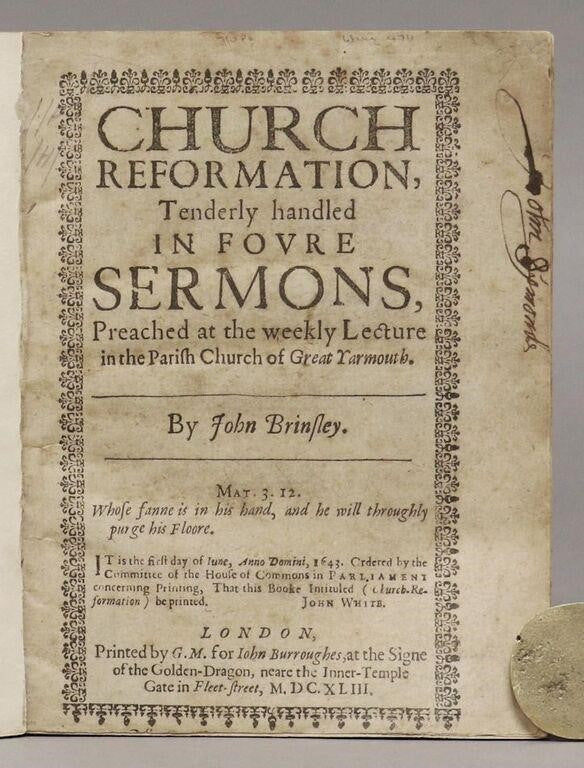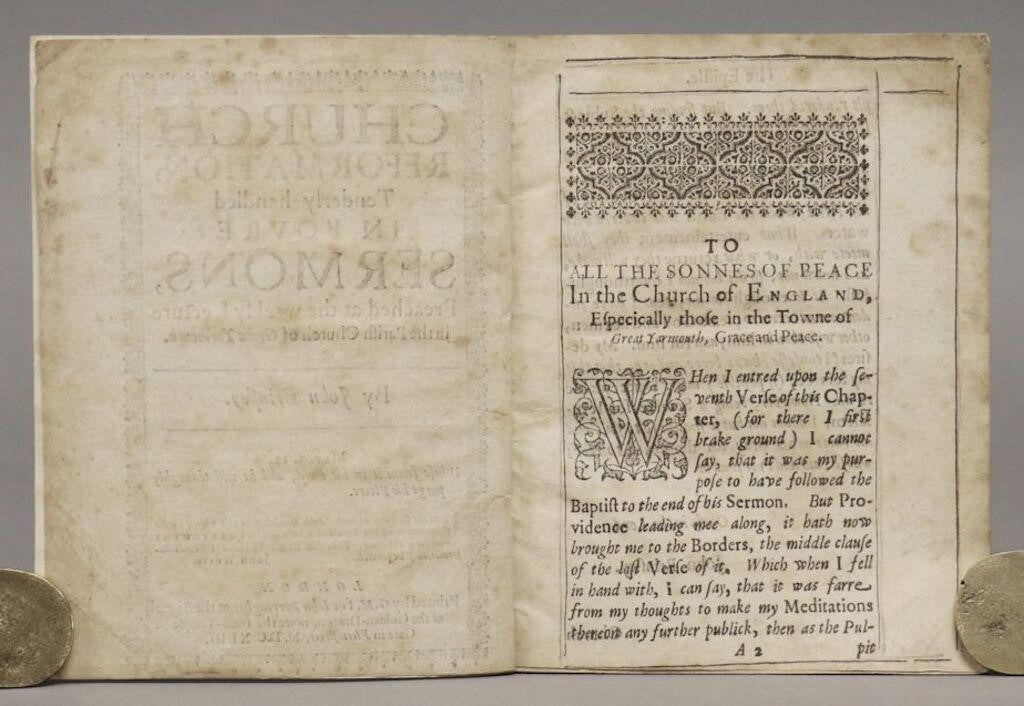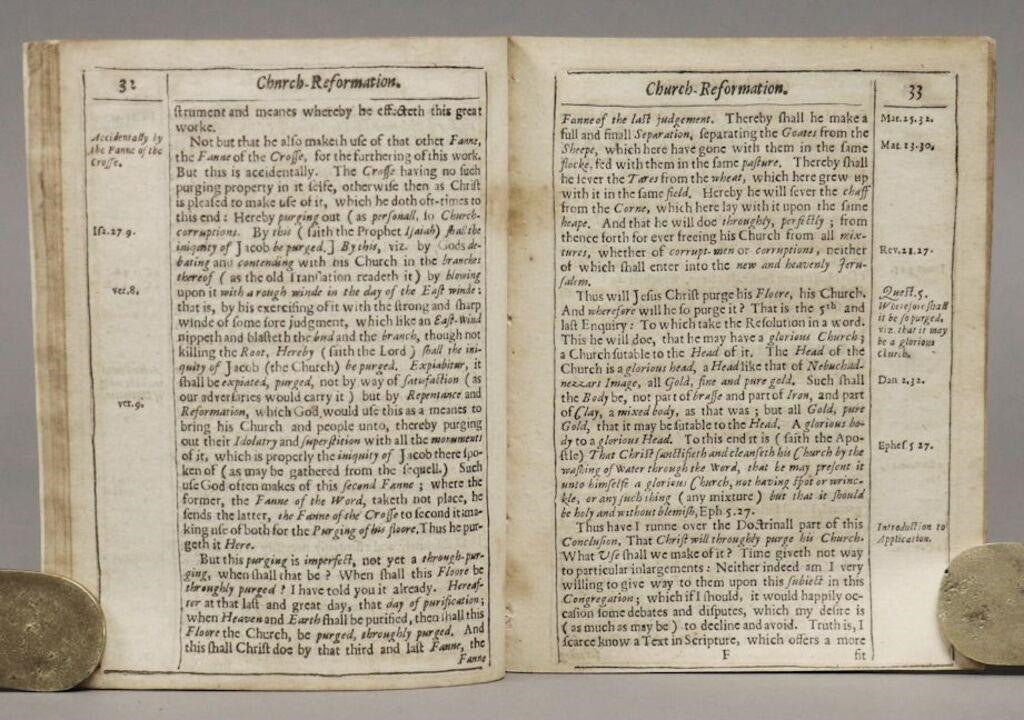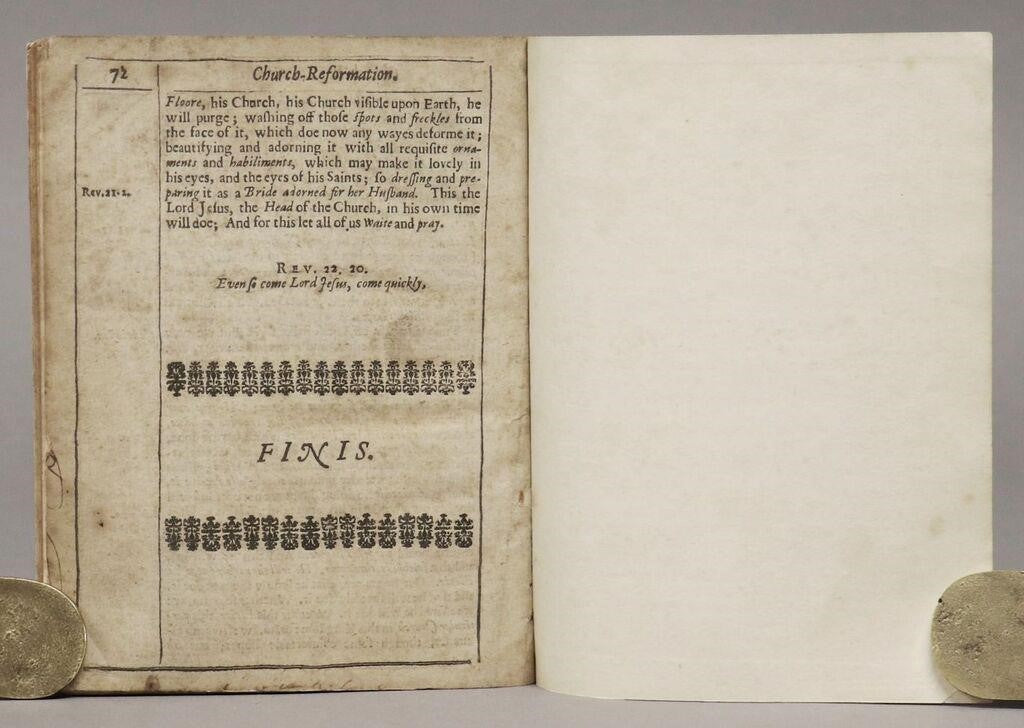Specs Fine Books
1643 JOHN BRINSLEY. Important "Great Migration" Provenance Puritan on Religious Liberty and Christian Abuses of Political Power.
1643 JOHN BRINSLEY. Important "Great Migration" Provenance Puritan on Religious Liberty and Christian Abuses of Political Power.
Couldn't load pickup availability
An incredibly important piece of Puritan, Presbyterian theology with ties to the Great Migration and the ideals of religious liberty in America.
John Brinsley [1600-1665] was a prominent puritan divine. His father was an educator and his father in law was the famed divine and author, Joseph Hall. Educated by his father, he was then admitted to Emmanuel College, Cambridge, at the age of thirteen and a half years. At just 18, he accompanied his uncle, Dr. Hall, who was at that time dean of Worcester, to the Synod of Dort (1618-19) and acted as his amanuensis. On his return to Cambridge, he was elected to a scholarship, graduating B.A. in 1619 and M.A. in 1623). After being ordained, he first preached at Preston, near Chelmsford.
In 1625 he was appointed by the corporation of Great Yarmouth as their minister, but his appointment was argued against by the Dean of Norwich. He continued to preach during the many years of legal dispute. By 1632, Brinsley was forbidden from engaging in any ministerial duty at Yarmouth altogether. He was sent to prison, along and four others who were sentenced for supporting his ministry.
By 1642, he was associated with the Presbyterians and his position had greater stability. He ministered in the same church as the famed William Bridge. Brinsley preaching the Presbyterian services and Bridge preaching the Congregationalist services. The building was large enough for both services to be held simultaneously.
Unsurprisingly, at the Restoration of Charles II in 1662, Brinsley was ejected for non-conformity along with William Bridge, Thomas Watson, John Owen, etc., He was apparently offered considerable promotion and financial gain to join the Anglican communion, which he refused.
The present work is quite important both with reference to the Westminster Assembly of 1643, but also toward the development of religious liberty and thought in America. Brinsley was a Presbyterian, but a moderate. Once the Presbyterians gained political advantage under Cromwell [1643], many Presbyterians immediately wanted to shut down the Anglican church altogether, have Cromwell institute a national Presbyterian Church, and turn England, Scotland, Ireland, and Wales into a single Presbytery governed from London, or perhaps Edinburgh.
Many more moderate Presbyterians, Independents, and Baptists began issuing pamphlets against these moves, stating that the Presbyterians had become no better than Popes and Prelates. These ministers found themselves equally concerned with the encroachment of Anglican conformity laws and Presbyterian rule. It was primarily this movement that Roger Williams argued against and which caused his ouster.
This conflict involving the fundamental role of religion at the national, programatic level, continued to be problematic in America all the way through the development of the Constitution. And one could certainly argue that the tendency to view political power as religious power continues to our time in many Christian traditions and movements.
Brinsley argued that reformation [by which he means national religious revival] should instead be sought without the use of coercion and misused power, but through spiritual means of prayer, godliness, the persuasive power of the Gospel, etc.
Brinsley, John. Church Reformation, Tenderly Handled in Foure Sermons. London: by G.M. for John Burroughes, 1643. 72pp.
Fascinatingly, the present work also bears the 17th century signature early American migrant, John Symonds [1595-1671]. Symonds was originally from Great Yarmouth where Brinsley was pastor and likely attended Brinsley's church, where the idea of religious liberty offered in the new America would have pinged on values affirmed from the pulpit. Symonds puritan tendencies are affirmed by his will, in which he leaves his copy of the Works of John Preston, the Works of Rogers [probably Richard Rogers], and other theological works to his son, James. Great Yarmouth itself was a port of departure where ships moved from it's bay to Holland, to Massachusetts.
Symonds was a skilled furniture maker who was a part of the Great Migration from Great Yarmouth in 1636. John and his sons James and Samuel were influential early American craftsmen, and today he is thought of as the founder of the "Salem School" of early American furniture. A work by James Symonds, John's son, sold at Christie's for $2.4 million.
Very scarce, with the ESTC listing only one copy in North America.
Rather nicely preserved as shown. The title page is toned and the remainder has some light to moderate foxing and handling to contents, lower margin trimmed a bit tightly but no loss. Good.
Share








